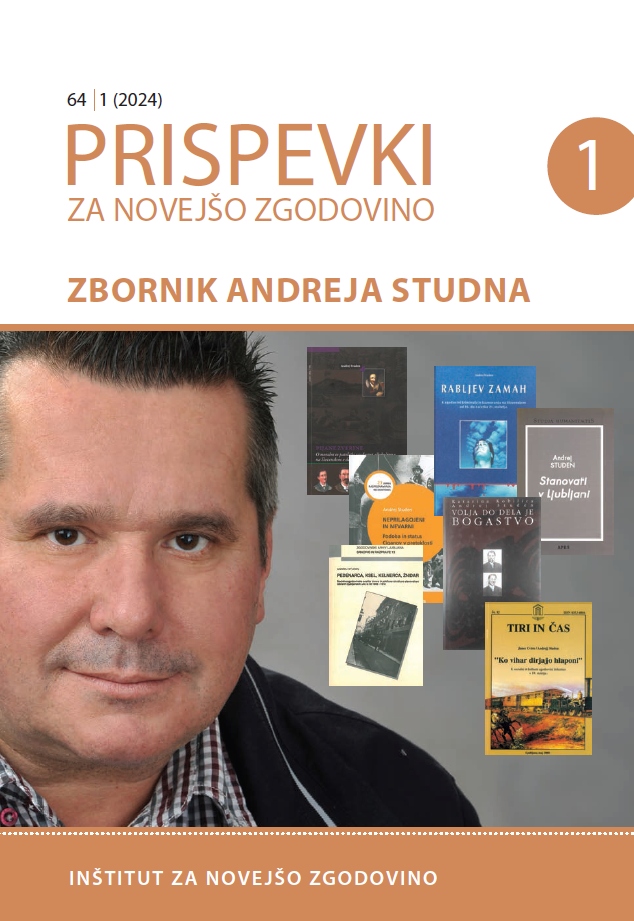Unmarried Mothers between Norms and Practice
DOI:
https://doi.org/10.51663/pnz.64.1.25Keywords:
illegitimate mothers, Habsburg Monarchy, Kingdom of SCS, illegitimate children, courtsAbstract
In the Habsburg Monarchy, the civil rights of illegitimate mothers and children were primarily regulated by the Austrian Civil Code of 1811. Under this code, illegitimate children did not enjoy the same rights as legitimate ones. Nevertheless, the illegitimate father was obligated to provide for them. The extent to which this progressive principle in Austrian law was practically implemented remains uncertain. This study investigates the frequency with which illegitimate mothers pursued legal recourse when fathers refused financial responsibility for their children. Additionally, it examines how often these mothers successfully obtained paternity recognition. The paper addresses these inquiries by analysing one hundred preserved custody court files from the District Courts in Rakek, Lož, and Cerknica between 1899 and 1945, alongside other relevant civil law documents.
References
Buske, Sybille. Fräulein Mutter und ihr Bastard: Eine Geschichte der Unehelichkeit in Deutschland 1900–1970. Göttingen: Wallstein Verlag, 2004.
Cergol Paradiž, Ana. V oteti deci je zaloga za našo močno in silno državo – skrb za zaščito otrok v prvi Jugoslaviji. Aida Škoro Babić idr. (ur.). Zgodovina otroštva, 266–77. Ljubljana: Zveza zgodovinskih društev Slovenije, 2012.
Cvirn, Janez. Najdenišnice - nagrada za lahkomiselnost in nemoralnost: o ukinjanju najdenišnice v Ljubljani v šestdesetih letih 19. stoletja. Prispevki za novejšo zgodovino 52, št. 2 (2012): 7–44.
Čeč, Dragica. Nasilne detomorilke ali neprištevne žrtve?: spreminjanje podobe detomora v 18. in začetku 19. stoletja. Acta Histriae 15, št. 2 (2007): 415–40.
Drnovšek, Jaša. Če bi vsi vstali, bi bil polhn Rancerebar otruk! Primer Filomene Permoser, izvajalke splavov. Zgodovina za vse 29, št. 1 (2022): 81–100.
Leskošek, Vesna. Zvrnjena tradicija. Ljubljana : Založba /*cf., 2002.
McEwen, Britta. Outsider Bodies, Everyday Lives: Single Mothers and Their Children in Red Vienna. Austrian History Yearbook 54 (2023): 177–91.
McEwen, Britta. Shame, Sympathy, and the Single Mother in Vienna, 1880–1930. Journal of Women’s History 35, št. 1 ( 2023): 100–20.
Mitterauer, Michael. Ledige Mütter: zur Geschichte illegitimer Geburten in Europa. München: Beck, 1983.
Šelih, Alenka. Ženske, kazensko pravo in kriminaliteta: storilke kaznivega dejanja detomora in umora v spisih Deželnega sodišča v Ljubljani (1899–1910). V: Marta Verginella (ur.). Dolga pot pravic žensk: pravna in politična zgodovina žensk na Slovenskem, 213–30. Ljubljana: Znanstvena založba Filozofske fakultete: Studia humanitatis, 2013.
Verginella, Marta (ur.). Slovenka: prvi ženski časopis (1897–1902). Ljubljana: Znanstvena založba Filozofske fakultete, 2018.
Vermeesch, Griet. The legal agency of single mothers: Lawsuits over illegitimate children and the uses of legal aid to the poor in the Dutch town of Leiden (1750–1810). Journal of Social History 50, št. 3 (2016): 51–73.
Žnidaršič-Žagar, Sabina. Nezakonske matere: objektivno gledano je lahko tudi malo veliko. Delta: revija za ženske študije in feministično teorijo 3, št. 1-2 (1997): 57–63.
Žnidaršič-Žagar, Sabina. Ženski so pa vzrasle svetlejše dolžnosti nego kuhati in prati: podoba in pojavnost žensk na Slovenskem: Slovenke, od sredine 19. stoletja do 2. svetovne vojne. Ljubljana: Pedagoški inštitut, 2013.
Downloads
Published
Issue
Section
License
Copyright (c) 2024 Ana Cergol Paradiž

This work is licensed under a Creative Commons Attribution 4.0 International License.
Authors who publish with this journal agree to the following terms:
- Authors retain copyright and grant the journal right of first publication with the work simultaneously licensed under a Creative Commons Attribution License that allows others to share the work with an acknowledgement of the work's authorship and initial publication in this journal.
- Authors are able to enter into separate, additional contractual arrangements for the non-exclusive distribution of the journal's published version of the work (e.g., post it to an institutional repository or publish it in a book), with an acknowledgement of its initial publication in this journal.
- Authors are permitted and encouraged to post their work online (e.g., in institutional repositories or on their website) prior to and during the submission process, as it can lead to productive exchanges, as well as earlier and greater citation of published work (See The Effect of Open Access).


